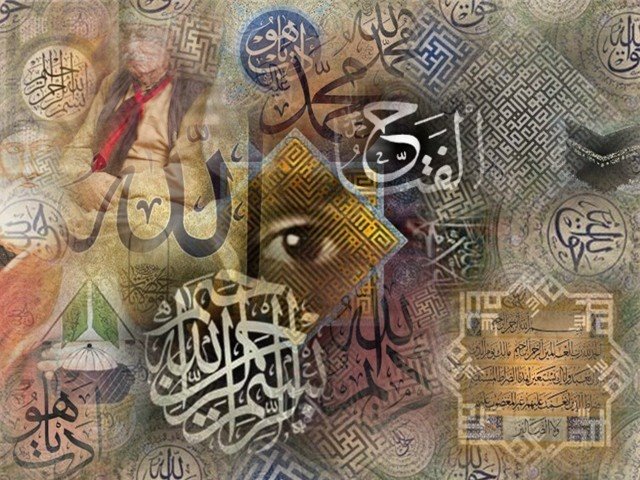Her Yer Kerbela, Her Gun Asura.
From time to time, I teach Islamic history at a university.
People sometimes ask me to explain why, in places like Iraq, people are still in such intense conflict over events that took place so long ago.
I usually end up quoting William Faulkner--
"The past is never dead. It's not even past."
As a Muslim Southerner, how else would I explain the importance of Kerbela ? ;)
Sometimes the issue is written off by Westerners as having to do with age-old grudges. Some Western academics try to understand the Shi'i perspective as having something to do with a collective guilt that more of the early umma did not come to the assistance of Imam Huseyin. Many Sunni Muslims write it off as some form of idolatry, or an obsessive interest in lineage. Most accounts by non-Shi'i, whether Sunni or non-Muslim --however understanding or sympathetic-- tend to explain the Shi'i position in terms of the family lineage from the 12 Imams back to the Prophet Muhammad.
But actually it's not really about that. Hz. Imam Ali himself states in the Nahjul Balagha that character and nobility are found in one's actions, not in their family line. All of the major Shi'i historical scholars maintained that the 12 Imams were who they were based on their character, and would have been the Imams whether they were from the family of Hz. Muhammad or not.
And the importance of the story of Kerbala is not only one of Sunni/Shi'i division over the politics of who should lead the community after the death of the Prophet. That's certainly a part of it, but that's not all. That's the part that people teaching the history of Islam in universities talk about, and it's the most accessible part of the question. That's what I talk about when I teach on this topic. But for many of the people for whom this issue is important, the question has much more to do with injustice.
The story, although significant in its own historical terms and in the context of understanding Islamic history, has taken on a life of its own-- a living, breathing story that is every day infused with new meaning. It functions as an archetype of the injustice and oppression that takes place on a daily basis throughout the world, and in particular, the suffering that takes place at the hands of tyrants who use religion to prop up their tyranny. And every day, and in every place, the events of Kerbala are reinterpreted to exemplify current struggles.
For many, particularly the Alevi of Turkey and the Ahl-e Haqq of Iran and Iraq, the story of Kerbala is a warning against the grave injustices that are committed by so-called "religious" states or other authorities that marginalize, deny the rights of, and sometimes outright kill members of religious minorities.
In Iran at exactly this time last year-- and that symbolism was not accidental-- Iranians took to the streets with the image of Kerbala in their minds, and the name of Hz. Imam Huseyin on their lips. In Iran today, apparently, Yezid can even take the form of Shi'i religious authorities.
So, it's always being reinterpreted for the current moment... where is Kerbala today? Who are the martyrs of today's Ashura?
And they still exist. Many, many, on a metaphorical level, and of all faiths. And, sadly, there are many this very week in who were literally killed in the actual city of Kerbala, Iraq for their religious beliefs as they went to pay their respects with their families at the shrine of Hz. Imam Huseyin.
And it's not only a question of Sunni or Shi'a. Many Sunni, particularly Sufis, commemorate these events every years, seeing in that story the example of courageousness and principle against forces of aggression who twisted religions to fit their own quest for personal power. This is a universal struggle, and the martyrs of today's ongoing Ashura live in Kerbalas throughout the world. Some are Sunni. Some are Shi'i. Some are Christian, Jewish, Sikh, Hindu, Buddhist, Pagan or Atheist-- but they are living the principle of Imam Huseyin and his companions. No matter what your faith, this tragic story can be an example-- as it was for Mohandas Ghandi.
Because it's not just a story of an Islamic succession crisis of the early Caliphate. It's the story of humanity.
This is Kerbela, and today is Ashura.
And the many attacks on Shi'i pilgrims in Iraq over the last week and the arson of the Harabati Tekke (an important Bektashi center in Macedonia) by fundamentalists a few days ago, as well as several arson attacks on Alevi Cemevis in Turkey over the last couple of months are ample evidence of this. The struggles of other religious minorities in the Middle East tell this story. The struggles of women in Afghanistan tell this story. The struggle of Tibetans to reclaim their culture and their homeland is also telling this story. Anyone who is struggling for their rights against entrenched power--especially a violent form of power that pretends to represent religious authority-- is living the story of Kerbela. It's everyone's story. And it could even be your story-- no matter what your religion or lack thereof or what part of the globe you may happen to live in. It's not about religion. It's not about culture. It's about the everyday struggles of humanity for the best of their principles against those who would deny them for personal gain.
And that's here. And it's now.
Grazing in the Gardens of Paradise
1 day ago















